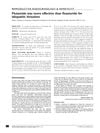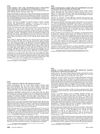55 citations,
March 2000 in “American journal of clinical dermatology” Antiandrogens, particularly flutamide and CPA, are most effective for treating hirsutism, with long-term use needed for best results.
 December 1999 in “Evidence-based obstetrics and gynecology/Evidence-based obstetrics & gynecology”
December 1999 in “Evidence-based obstetrics and gynecology/Evidence-based obstetrics & gynecology” Flutamide worked better than finasteride for reducing excessive hair growth in women, but had more side effects.
 47 citations,
March 2004 in “European journal of endocrinology”
47 citations,
March 2004 in “European journal of endocrinology” Spironolactone plus finasteride reduces hirsutism more effectively.
 40 citations,
January 2003 in “Gynecological Endocrinology”
40 citations,
January 2003 in “Gynecological Endocrinology” Finasteride effectively reduces hair growth in women with polycystic ovary syndrome or idiopathic hirsutism.
 32 citations,
July 1999 in “Fertility and Sterility”
32 citations,
July 1999 in “Fertility and Sterility” Finasteride and flutamide both reduce hair growth, but finasteride has fewer side effects.
 May 2020 in “Fertility and Sterility”
May 2020 in “Fertility and Sterility” Nonobese, normotensive Indian women with PCOS may have a higher risk of heart problems linked to inflammation and insulin resistance.
 1514 citations,
December 2011 in “Fertility and sterility”
1514 citations,
December 2011 in “Fertility and sterility” Experts agree that PCOS affects women's health in complex ways, but more research is needed to understand and treat it effectively.
 49 citations,
September 2012 in “The Journal of clinical endocrinology and metabolism/Journal of clinical endocrinology & metabolism”
49 citations,
September 2012 in “The Journal of clinical endocrinology and metabolism/Journal of clinical endocrinology & metabolism” The document concludes with guidance for doctors on diagnosing and treating hirsutism effectively and safely.
 9 citations,
July 2009 in “Journal Of Endocrinology, Metabolism And Diabetes Of South Africa”
9 citations,
July 2009 in “Journal Of Endocrinology, Metabolism And Diabetes Of South Africa” The document concludes that managing PCOS involves treating symptoms and reducing long-term metabolic risks, with lifestyle changes being important.
 June 2022 in “Biomedical reports”
June 2022 in “Biomedical reports” STK11 gene variations do not predict how well metformin will work for PCOS, but may affect hair loss and excess hair growth.
 76 citations,
December 1997 in “Fertility and Sterility”
76 citations,
December 1997 in “Fertility and Sterility” Finasteride reduces hair growth better, but spironolactone has more side effects.
 75 citations,
October 1999 in “European journal of endocrinology”
75 citations,
October 1999 in “European journal of endocrinology” Finasteride is a safe, effective treatment for hirsutism with fewer side effects.
 15 citations,
September 2021 in “Frontiers in Endocrinology”
15 citations,
September 2021 in “Frontiers in Endocrinology” Hormone therapy increases the risk of heart-related issues in transgender women and may affect heart health in transgender men.
 1 citations,
December 2022 in “Biomedicines”
1 citations,
December 2022 in “Biomedicines” Middle-aged women with PCOS often continue to experience symptoms related to high androgen levels, like unwanted hair growth.
 7 citations,
June 2020 in “Journal of Cosmetic Dermatology”
7 citations,
June 2020 in “Journal of Cosmetic Dermatology” Turkish women with hirsutism experience lower quality of life, especially those with PCOS, regardless of hair growth severity.
 22 citations,
January 2019 in “Endocrinology and metabolism”
22 citations,
January 2019 in “Endocrinology and metabolism” An mFG score of 7 or higher indicates hirsutism in Filipino women, often linked to higher free testosterone levels.
 February 2010 in “Journal of The American Academy of Dermatology”
February 2010 in “Journal of The American Academy of Dermatology” Ustekinumab significantly improved sexual function and quality of life for people with moderate to severe psoriasis.
 February 2010 in “Journal of The American Academy of Dermatology”
February 2010 in “Journal of The American Academy of Dermatology” White hirsute women with PCOS have higher insulin resistance, but similar nitric oxide and fibrinogen levels compared to those with idiopathic hirsutism.
 February 2010 in “Journal of The American Academy of Dermatology”
February 2010 in “Journal of The American Academy of Dermatology” Lower nitric oxide and higher fibrinogen found in hirsute women; impaired sexual function in 22.6% of hair loss patients, linked to psoriasis severity.
 February 2010 in “Journal of The American Academy of Dermatology”
February 2010 in “Journal of The American Academy of Dermatology” Methotrexate treatment for rheumatoid arthritis has a serious infection rate of about two per 100 patient-years.
 7 citations,
August 2019 in “Journal of Ovarian Research”
7 citations,
August 2019 in “Journal of Ovarian Research” Blood removal and birth control pills both helped with hormone levels in women with PCOS, but birth control was better for regular periods and blood removal had fewer side effects.
 23 citations,
January 2019 in “International Journal of Dermatology”
23 citations,
January 2019 in “International Journal of Dermatology” Finasteride improves hair growth and reduces hirsutism in women, but side effects and optimal dosages need further research.
 1 citations,
June 2023 in “Curēus”
1 citations,
June 2023 in “Curēus” PCOS affects nearly 25% of female medical and dental students, impacting their academic and social lives.
 24 citations,
March 2017 in “Archives of Gynecology and Obstetrics”
24 citations,
March 2017 in “Archives of Gynecology and Obstetrics” The study found that women with hyperandrogenic PCOS have higher levels of AKT1 and AKT2 proteins in their cells, which may lead to cell dysfunction.
 2 citations,
April 2023 in “BMC endocrine disorders”
2 citations,
April 2023 in “BMC endocrine disorders” The link between physical signs of high male hormones and hormone levels in women with PCOS changes with age.
30 citations,
February 2016 in “British journal of dermatology/British journal of dermatology, Supplement” Some medications can reduce excessive hair growth in women, but more research is needed to find the best treatment combinations.
 10 citations,
September 2015 in “Gynecological Endocrinology”
10 citations,
September 2015 in “Gynecological Endocrinology” Both treatments reduced excessive hair growth in PCOS, but there was no difference in weight, hair score, hormone levels, or insulin resistance.
 38 citations,
May 2006 in “Archives of Gynecology and Obstetrics”
38 citations,
May 2006 in “Archives of Gynecology and Obstetrics” Women with only irregular periods or excess hair have a better hormone profile than those with full PCOS, but both groups are similar, indicating a need for better PCOS diagnosis methods.
10 citations,
January 2019 in “Journal of the American Academy of Dermatology” Testosterone increases hair growth and acne in transgender men.
 42 citations,
July 2015 in “Journal of The American Academy of Dermatology”
42 citations,
July 2015 in “Journal of The American Academy of Dermatology” The conclusion is that oral contraceptives and antiandrogens can treat hirsutism and acne in women with cutaneous hyperandrogenism, but more research is needed for effective treatments, especially for hair loss.


























